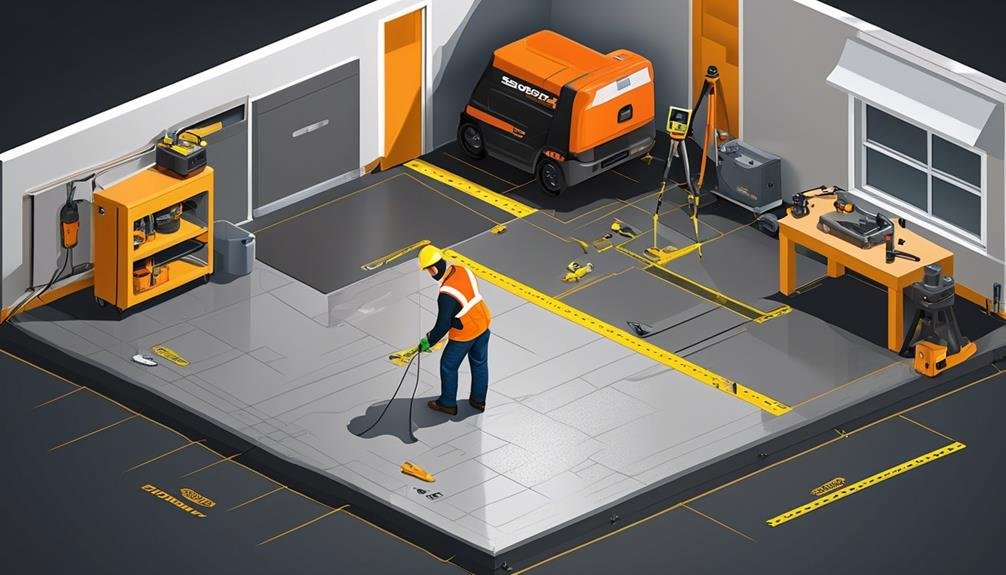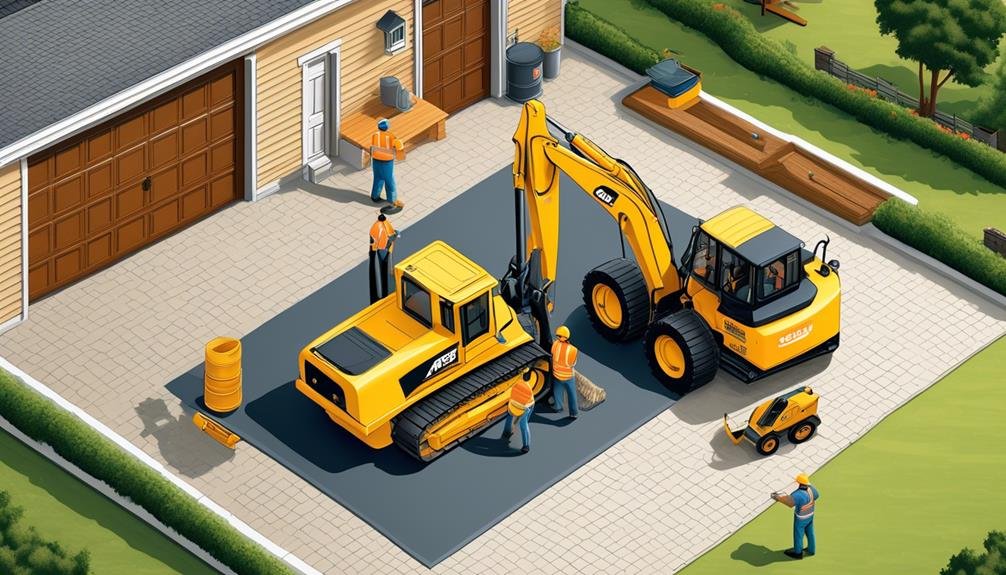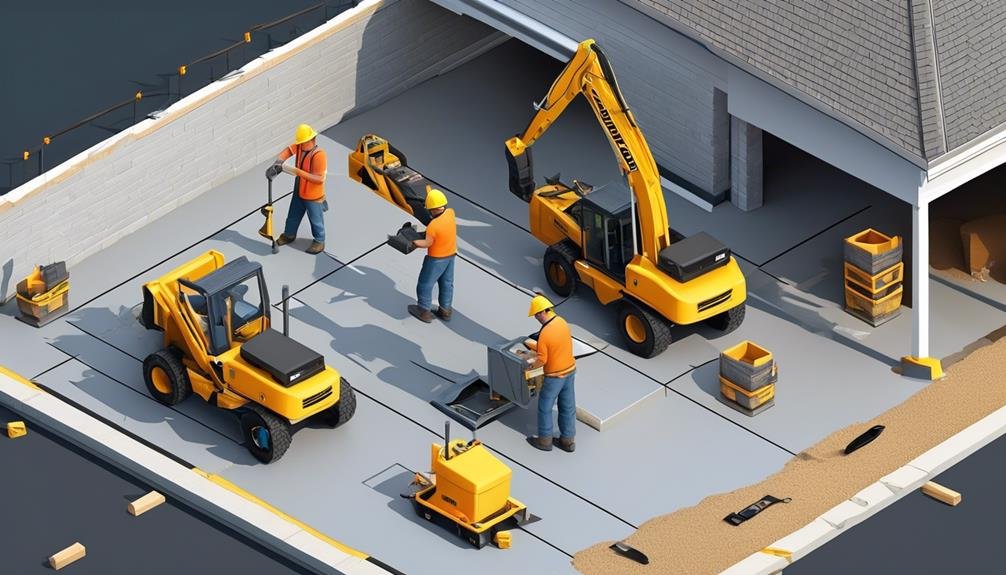Are you wondering if it's really necessary to hire a contractor to level your garage floor before installing equipment? Well, let's explore this theory together.
You might be surprised to learn that a level surface is not just a matter of aesthetics, but it plays a crucial role in the overall functionality and durability of your garage. Uneven floors can lead to a whole host of problems that could potentially cost you more in the long run.
But fear not, because in this discussion, we will delve into the benefits of hiring a professional contractor, the importance of a level surface, and the potential problems that can arise if you neglect this crucial step.
So, hang tight and let's uncover the truth behind the necessity of hiring a contractor for leveling your garage floor before installing equipment.
Key Takeaways
- Hiring a contractor to level the garage floor before installing equipment brings expertise and experience, ensuring accurate assessment and effective leveling.
- A level surface is crucial for proper installation and functionality of equipment, providing stability, preventing accidents, and allowing for easier movement of heavy machinery.
- An uneven floor can lead to equipment instability, poor drainage, difficulty in moving heavy objects, accidents, and weakened garage foundation over time.
- Hiring a professional is cost-effective as they have the knowledge, experience, and specialized tools to complete the job efficiently, reducing the risk of mistakes and additional expenses.
Benefits of Hiring a Contractor
Hiring a contractor for leveling a garage floor before installing equipment offers numerous benefits that can save you time, money, and ensure a professional and efficient job. Here are some key advantages to consider.
Firstly, hiring a contractor brings expertise and experience to the table. These professionals have the knowledge and skills to assess the condition of your garage floor accurately. They can identify any underlying issues that may affect the installation process or the long-term durability of the equipment. By addressing these concerns upfront, a contractor can prevent potential problems down the line.
Secondly, contractors have access to specialized equipment and tools. They possess the necessary machinery to level the garage floor effectively and efficiently. This equipment allows them to work faster and achieve precise results. By relying on their expertise and resources, you can be confident that the job will be done right the first time.
Additionally, hiring a contractor saves you time and effort. Leveling a garage floor can be a time-consuming and physically demanding task. By delegating this responsibility to a professional, you can focus on other important aspects of your project. Moreover, a contractor can complete the job in a shorter timeframe, allowing you to move forward with your equipment installation sooner.
Lastly, hiring a contractor can save you money in the long run. By addressing any potential issues before the installation, you can avoid costly repairs or replacements in the future. Additionally, a contractor can provide you with a detailed cost estimate upfront, ensuring that there are no unexpected expenses along the way.
Importance of a Level Surface
Achieving a level surface is crucial for proper installation and functionality of equipment in your garage. Whether you plan to use your garage as a workshop, a storage space, or a place to park your car, having a level floor is essential. A level surface ensures that your equipment will be stable and secure, preventing any potential accidents or damage. It also allows for easier movement of heavy machinery and equipment, making it safer and more convenient for you to use your garage.
A level floor also helps to distribute the weight of the equipment evenly, reducing the risk of strain and stress on certain areas of the floor. This is especially important if you plan to install heavy machinery or large tools in your garage. Uneven surfaces can cause excessive wear and tear on the equipment, leading to costly repairs or replacements down the line.
Additionally, a level floor provides a solid foundation for your equipment, allowing it to operate smoothly and efficiently. It ensures that the equipment is properly aligned, minimizing vibrations and reducing the noise produced during operation. This is particularly important if you live in a residential area where noise restrictions may apply.
Potential Problems With an Uneven Floor

When dealing with an uneven floor in your garage, it's important to address the potential problems that can arise. Ignoring the issue could lead to a variety of issues that can impact the functionality and safety of your garage.
Here are three potential problems you may encounter:
- Equipment Instability: An uneven floor can cause equipment, such as workbenches or machinery, to wobble or tilt. This instability not only compromises the effectiveness of the equipment but also poses a safety risk to anyone using it. Uneven surfaces can lead to accidents, injuries, and damage to both the equipment and your garage.
- Poor Drainage: An uneven floor can disrupt the natural flow of water, leading to poor drainage. This can result in water pooling in certain areas of your garage, causing damage to your belongings and potentially leading to mold or mildew growth. Additionally, poor drainage can weaken the foundation of your garage over time, leading to further structural issues.
- Difficulty in Moving Heavy Objects: An uneven floor can make it challenging to move heavy objects, such as vehicles or large machinery, in and out of your garage. This can be frustrating and time-consuming, potentially causing damage to the objects being moved and the floor itself.
To prevent these potential problems, it's crucial to level your garage floor before installing any equipment. By doing so, you can ensure a safe, functional, and efficient workspace in your garage.
Cost-Effectiveness of Hiring a Professional
To ensure a cost-effective solution for leveling your garage floor and addressing the potential problems discussed earlier, it is essential to consider hiring a professional. While you may be tempted to save money by attempting the leveling process yourself, it is important to recognize that doing so can lead to costly mistakes and potential damage to your equipment in the long run. Hiring a professional contractor not only ensures that the job is done correctly but also saves you time and effort.
When weighing the cost-effectiveness of hiring a professional, it is helpful to consider the following factors:
| Factors to Consider | Hiring a Professional | DIY Approach |
|---|---|---|
| Expertise | Professionals have the knowledge and experience to properly assess and level your garage floor. | DIYers may lack the necessary expertise, leading to potential mistakes and additional expenses. |
| Equipment | Professionals have access to specialized tools and equipment required for the job. | DIYers may need to rent or purchase equipment, adding to the overall cost. |
| Time | Professionals can complete the leveling process efficiently, saving you time and allowing you to focus on other tasks. | DIYers may spend significant amounts of time researching, planning, and executing the project. This can lead to delays and disruptions to your daily routine. |
Ensuring Proper Equipment Installation

You can ensure a successful installation of your equipment by carefully following the proper guidelines and utilizing the necessary tools and techniques. Installing equipment can be a complex task, but with the right approach, you can avoid common pitfalls and ensure that your equipment operates efficiently and safely. Here are three important steps to consider:
- Read the manufacturer's instructions: Before you start the installation process, take the time to thoroughly read and understand the manufacturer's instructions. These instructions will provide you with valuable information on the proper installation techniques, required tools, and any specific considerations for your equipment.
- Prepare the installation area: Before installing your equipment, it's crucial to prepare the installation area properly. This may involve clearing the space, ensuring that the floor is level and stable, and making any necessary modifications or repairs. Following these steps will help ensure that your equipment is installed on a solid foundation and reduces the risk of damage or accidents.
- Seek professional assistance if needed: If you're unsure about any aspect of the installation process, it's always a good idea to seek professional assistance. Hiring a qualified technician or contractor can provide you with the expertise and experience needed to ensure a proper installation. They can also help you navigate any complex or specialized requirements specific to your equipment.
Long-Term Durability of Your Garage Floor
To ensure long-term durability of your garage floor, it is essential to properly maintain and protect the surface from wear and tear. By following a few simple steps, you can extend the lifespan of your garage floor and avoid costly repairs in the future.
One important aspect of maintaining your garage floor is regular cleaning. Sweep or vacuum the floor on a regular basis to remove dirt and debris. This prevents them from scratching the surface or causing stains. Additionally, consider using a mild detergent and water to mop the floor periodically to remove any stubborn stains or spills.
Another way to protect your garage floor is by applying a sealant or coating. This helps to create a barrier between the surface and potential damage. There are different types of sealants available, such as epoxy or polyurethane coatings, which provide various levels of protection. Consult with a professional to determine the best option for your specific needs.
Lastly, be mindful of how you use your garage space. Avoid dragging heavy equipment or vehicles across the floor, as this can cause cracks or other damage. Consider using mats or pads under heavy objects to distribute weight evenly and reduce pressure on the floor.
By implementing these maintenance practices and taking precautions, you can ensure the long-term durability of your garage floor. Refer to the table below for a summary of the key points discussed.
| Maintenance Steps | Benefits |
|---|---|
| Regular cleaning | Prevents scratches and stains |
| Applying sealant or coating | Creates a protective barrier |
| Using mats or pads | Reduces pressure and prevents damage |
Time-Saving Solution for Homeowners

For homeowners looking for a time-saving solution, there's a practical and efficient method to level a garage floor before installing equipment. Instead of hiring a contractor, you can opt for a self-leveling underlayment. This innovative product offers several benefits that make it an ideal choice for homeowners seeking convenience and efficiency.
Here are three reasons why self-leveling underlayment is a time-saving solution for leveling your garage floor:
- Easy application: Self-leveling underlayment is designed to be user-friendly, allowing homeowners to apply it themselves without the need for professional assistance. Its self-leveling properties ensure a smooth and even surface, eliminating the need for time-consuming manual leveling.
- Quick drying time: Traditional methods of leveling a garage floor can take days to dry, causing unnecessary delays in your project. Self-leveling underlayment, on the other hand, dries quickly, allowing you to proceed with the installation of your equipment sooner.
- Versatile use: Self-leveling underlayment is suitable for a variety of flooring materials, including tiles, hardwood, and carpet. This versatility means you can use it not only for your garage but also for other areas of your home, saving you time and effort.
Expertise and Experience of Professional Contractors
While self-leveling underlayment is a convenient option for homeowners looking to level their garage floor, there are certain benefits to hiring professional contractors who possess the expertise and experience in this field.
Professional contractors have spent years honing their skills and acquiring knowledge about the best techniques and materials for leveling garage floors. They understand the intricacies of the job and can provide a level of expertise that may not be easily attainable by the average homeowner.
One of the main advantages of hiring professional contractors is their ability to accurately assess the condition of your garage floor. They've the expertise to identify any underlying issues that may affect the leveling process, such as cracks, uneven surfaces, or weak spots. This knowledge allows them to implement appropriate solutions and ensure a solid foundation for your equipment.
Additionally, professional contractors have access to specialized tools and equipment that are specifically designed for leveling garage floors. These tools make the process more efficient and effective, saving you time and effort. They also have access to high-quality materials that are specifically formulated for self-leveling applications, ensuring a durable and long-lasting result.
Another benefit of hiring professional contractors is their experience in managing unforeseen challenges that may arise during the leveling process. They've encountered various scenarios throughout their careers and have the knowledge and skills to adapt and overcome these obstacles. This experience can help prevent costly mistakes and ensure a successful outcome.
Frequently Asked Questions
How Long Does It Typically Take to Level a Garage Floor?
Typically, leveling a garage floor can take anywhere from a few days to a week, depending on the size and condition of the floor. It's important to hire a contractor to ensure proper leveling for your equipment's stability.
Are There Any DIY Methods for Leveling a Garage Floor?
Yes, there are DIY methods for leveling a garage floor, but hiring a contractor is recommended. They have the expertise, tools, and experience to ensure a proper and long-lasting job, saving you time and potential headaches.
Will Leveling the Garage Floor Affect the Structural Integrity of the Building?
Leveling the garage floor before installing equipment is crucial to ensure stability and prevent any structural issues. Hiring a contractor with expertise in this area will guarantee a proper and safe installation process.
Is It Necessary to Level the Garage Floor Before Installing Equipment?
Yes, it is necessary to level the garage floor before installing equipment. Uneven flooring can lead to instability, equipment damage, and safety hazards. Hiring a contractor ensures a professional job, ensuring proper leveling and a secure foundation for your equipment.
Can a Contractor Also Help With Repairing Any Cracks or Imperfections in the Garage Floor?
Yes, a contractor can help repair cracks and imperfections in your garage floor. They have the expertise and tools to fix any issues, ensuring a smooth and level surface for your equipment installation.
Conclusion
In conclusion, hiring a contractor to level your garage floor before installing equipment is a practical and cost-effective solution.
Not only does a level surface ensure proper equipment installation, but it also prevents potential problems that can arise from an uneven floor.
With the expertise and experience of professional contractors, you can have peace of mind knowing that your garage floor will be durable and long-lasting.
Save time and ensure a successful project by entrusting this task to skilled professionals.





